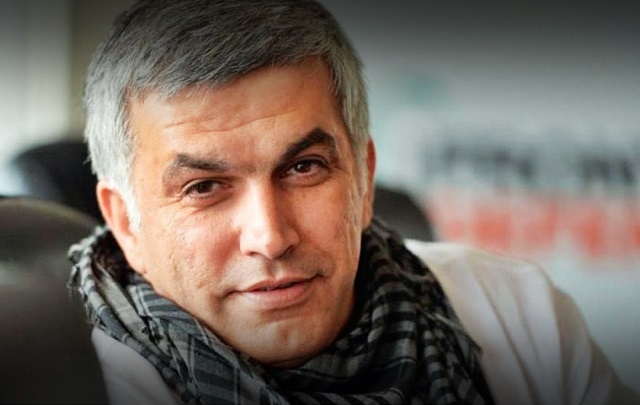Nabeel Rajab is one of Bahrain’s leading human rights defenders. He is the President of the Bahrain Center for Human Rights (BCHR), a founding director of the Gulf Center for Human Rights, and Deputy Secretary General of the International Federation for Human Rights. Nabeel is also a member of the Advisory Committee of Human Rights Watch’s Middle East Division. Yet despite his importance to many leading regional and international human rights organizations, Nabeel is unable to leave Bahrain due to a travel ban issued against him on 13 July 2015 by Bahrain’s Public Prosecutor.
In response to his human rights activism, Nabeel Rajab has faced repeated intimidation and harassment from the Bahraini authorities including arrest, imprisonment, and most recently his travel ban.
In May 2012, Bahraini authorities arrested Rajab at the Bahrain International Airport following his return from a human rights conference in Lebanon. Authorities arrested him on charges of participating in illegal protests. He served a two-year prison sentence and was released in May 2014.
Five months later, Bahraini authorities re-arrested Rajab and detained him for one month on accusations of insulting public institutions on Twitter.
On 20 January 2015, Bahraini authorities sentenced Nabeel Rajab to six months in prison on a charge of “publicly insulting official institutions” by criticizing the government on social media. In April of the same year, Bahraini security forces surrounded his home and arrested him following more critical tweets documenting torture in Bahrain’s prisons, and for criticizing Bahrain’s role contributing to civilian deaths in Yemen. Following international pressure from numerous human rights organizations and state governments including the US and a resolution passed by the European Parliament, authorities released Nabeel on 13 July 2015. The king of Bahrain issued a royal pardon calling on Nabeel’s release citing medical reasons. However, the Public Prosecution in Bahrain issued a new travel ban on him.
Nabeel Rajab’s lawyer has submitted four appeals against the travel ban. In addition to limiting his work as a human rights defender, it has hindered his abilities to travel with his sick wife who needs medical treatment that is unavailable in Bahrain. The ban is simply another tactic used by the Bahraini authorities to silence individuals like Nabeel who continue to speak out about ongoing human rights violations in the country. The Bahraini authorities have remained unresponsive to the appeals and the arbitrary travel ban remains in place.
Many international human rights NGOs continue to express their concerns about the ongoing harassment of Nabeel Rajab, and call on the government of Bahrain to lift this arbitrary travel ban. The travel ban imposed by the Bahraini authorities on Nabeel Rajab is a clear violation of international law and freedom of movement. It is simply an unlawful method of oppression used to silence critics and human rights defenders in Bahrain.





